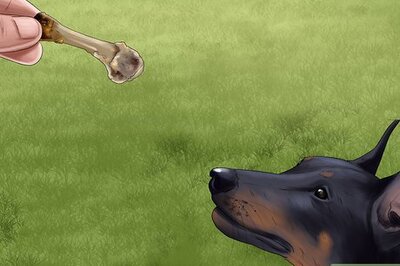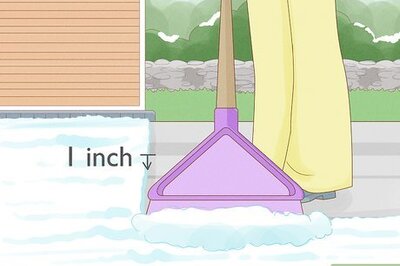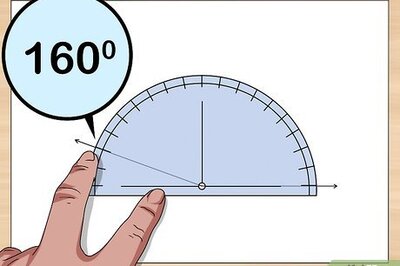
views
Cleaning Grass Regularly
Use a leaf blower to get rid of debris. Whether it be fallen leaves in autumn, fallen branches after a storm or some other accumulation of debris, a leaf blower can help you swiftly clear your turf. Designate one corner of your yard and blow all debris towards it. Once all debris is grouped, you can collect it for removal. You should only have to pass over the turf once to completely clear it of larger debris.
Rinse the turf with a garden hose. While a leaf blower is effective for larger debris, it might not clear the grass of dust or spills. Using a garden hose, rinse the entirety of the turf. Make sure to do so lightly; too much water pressure could damage the grass. Start from one end of your yard, moving across and sweeping the hose in a circular motion as you do.
Brush the grass using a broom or rake. Brushing the grass frequently will keep the grass blades pointed upwards, affording your lawn a more natural look. You can use a brush, as long as it has soft bristles. However, you’ll be better served using a broom or a rake; the added reach will make covering the whole yard easier and quicker. Start in one corner of your yard, and move horizontally as you brush. Once you’ve reached the opposite end, take a few steps back, and move across again. You should always brush in the same direction, against the grass’ natural grain.
Removing Spills and Stains
Blot spilled liquids with a paper towel. Paper towels should be enough to clean up most spills. You’ll want to be careful not to rub the liquid into the grass. Blot up liquid spills gently. As long as you act the moment the spill happens, it should be relatively easy to clean up.
Clean any stains with a solution of water and granular detergent. Mix a teaspoon of water with a pint of detergent in a container you can easily carry around. A bucket is your best bet for this. You can use a sponge or a soft cloth to rub the solution into the stain until it’s dislodged. Once the stain is dislodged, you can rinse away the detergent with a garden hose. This mild solution won’t damage your grass, and can clean up a variety of substances, such as coffee, alcohol or ice cream.
Scrape pasty or sticky residues off with a knife. Whether you’re dealing with gum, lipstick, crayon residue or paint, gently scrape it off the grass. Be careful not to accidentally cut the grass as you scrape. Follow the grass upwards with the knife rather than scrapping across.
Use mineral spirits to remove signs of solid debris. Soak a soft cloth in mineral spirits, then wipe the soiled blades of grass. Take care when cleaning with mineral spirits; you want to make sure the mineral spirits doesn’t go past the grass and beneath the turf as this could cause serious damage. Wear gloves when using mineral spirits, as it can irritate bare skin. Wear a respirator when working with mineral spirits, as the fumes can be toxic.
Maintaining Artificial Grass
Use a half vinegar, half water solution to kill bacteria. Artificial grass is a lot less likely to collect bacterial spores than natural grass; however it’s still possible, especially if you have pets. If you only need to spray a specific spot, just use a spray bottle. If you suspect the bacteria is more widespread, attach a hose-end sprayer to a garden hose and hose down the whole turf. A hose-end sprayer looks like a plastic bottle with a spray bottle nozzle. It screws into a garden hose and is usually used to spray fertilizer.
Hose and brush the turf once a week. Use a garden hose to spray water on your grass. This will keep it looking fresh as well as ridding it of small spills and odors. After hosing, use a broom or a rake to brush the grass. This will keep the grass blades pointing upwards, helping your lawn look fresh.
Avoid treading on artificial grass during winter. Snow and ice won’t damage the grass by themselves, but walking on the grass too much can cause snow to turn into a layer of ice. If this does happen, avoid the temptation to remove the ice, as this could damage the grass blades. Instead, you should wait until the snow and ice melt naturally. Avoid using salt to melt snow or ice. The residue can damage the grass’ carpet backing and prevent the lawn from draining properly.




















Comments
0 comment